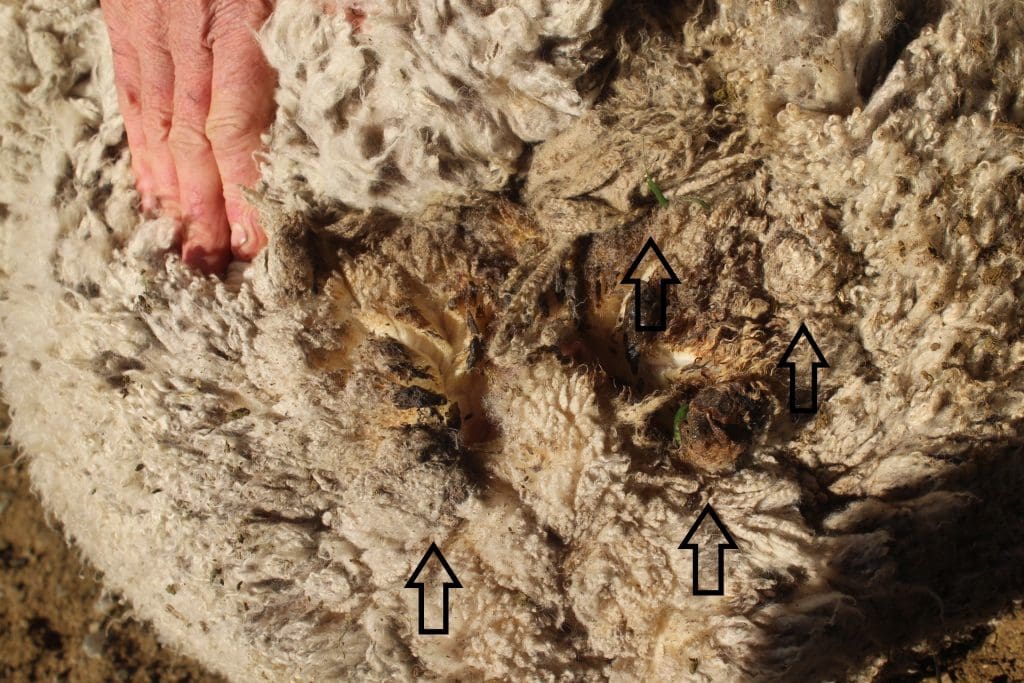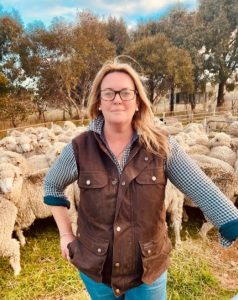
A young Merino ewe breech showing where rings have been used to capture loose skin.
A PROPOSAL for research into the use of rubber rings as a mulesing alternative has failed to get the support of peak grower body WoolProducers Australia.
The industry’s levy-funded research, development and marketing body Australian Wool Innovation has also not agreed to fund any research into the method.
Western Victoria superfine wool grower Geoff Phillips is among several producers who have been using rubber rings — with the use of pain relief and veterinary oversight — to remove excess skin from around the breeches of Merino sheep.
The procedure was outlined during a recent Australian Superfine Wool Growers Association farm tour and has been used for several years in some flocks. But currently is not specifically classified on the National Wool Declaration, and it falls outside the Australian definition of surgical mulesing, because it does not involve the use of shears.

WoolProducers Australia CEO Jo Hall.
WoolProducers Australia chief executive officer Jo Hall said the body does not support the use of elastrator rings for breech modification.
“WoolProducers is disappointed to see this method of breech modification being publicised without prior independent research trials being conducted as this will no doubt attract attacks from animal rights groups on our industry.
“The concern is that introducing another form of breech modification may not be acceptable to supply chains and only serve to further erode confidence in Australian wool,” she said.
“We saw the industry division regarding the sheep freeze branding debate, which was written off by both animal rights activists and our downstream customers because there was no independent research to verify welfare claims made by the developer.”
Ms Hall said WPA is supportive of genetic solutions for the mulesing issue and encourages further research and investment in this space.
“However, in terms of non-genetic alternatives, the wool industry needs to be clear what is going to be acceptable to customers in terms of mulesing alternatives.
“There is no point investing in alternatives unless we are guaranteed that it will be acceptable to the trade.”
Australian Wool innovation’s general manager research, Dr Jane Littlejohn, consulted members of the Woolgrower Industry Consultation Panel in August last year about a proposal for researching elastrator rings on breech wrinkle. WPA and the Australian Superfine Wool Growers Association are WICP members.
The WICP meeting’s published minutes said members broadly did not agree with the proposal put forward or the investment. Panel members suggested the proposal was substituting one technique with another, the minutes said.
An AWI spokesman said AWI was approached to fund a trial into the ring method before the August WICP 2021 meeting.
“A query was made by a consultant and that led to a proposal coming forward for review.
“This has not been funded,” the spokesman said.
New approach needs scientific evaluation

Dr Paul Swan: ring approach needs scientific evaluation.
SustainaWOOL program manager Dr Paul Swan said the integrity scheme is based on the principle that growers declare their practices and are willing to accept farm inspections and audits for full transparency. SustainaWOOL has been the only scheme that still recognises growers who modify sheep breeches using surgical mulesing.
“For those we have required, from the start, the use of pain relief.”
With the advent of mulesing clips and the use of freeze branding, SustainaWOOL changed its standards to accommodate the concept of ‘breech modification’ and growers are now asked if they modify breeches for flystrike and stain control and to specify the method used.
He said a grower is using rubber rings for breech modification can only be a part of SustainaWOOL if they have supportive legal/veterinary advice and utilise effective pain relief.
When growers notified SustainaWOOL that they were using rings for breech modification, Dr Swan contacted CSIRO, AWI and WoolProducers.
“There is not just one property doing this, there are several.”
SustainaWOOL considered the use of rings to remove excess skin as a form of breech modification. But it is currently not a recognised form of breech modification under the standards and guidelines of animal welfare for sheep, though a case could be argued, he said.
“But it is not clearly defined and our view was that because it is not a recognised approach, it potentially could run foul of state animal welfare acts.
“So our advice to the growers involved was that we did not recommend that they continue to use it in the face of alternatives,” he said.
“Our advice to them was that they should only proceed with independent veterinary advice and because it is very likely to be a painful procedure, ensure if they are doing it that they use pain relief.
“We took a view that our system needed to identify it and not bury it in ‘non-mulesed’ and we were only prepared to accept (those) growers in our scheme if they were proceeding on the basis of individual objective veterinary advice for their property and if they were using pain relief.”
Dr Swan said SustainaWOOl also took the view that the use of rings was an effective way of modifying the breech and it should be subject to scientific veterinary evaluation. He consulted with CSIRO on a simple low-cost preliminary research to examine the efficacy and the initial welfare implications of the approach. The proposal was put to Dr Littlejohn at AWI and to WoolProducers last year. Dr Swan said neither AWI nor WoolProducers supported the proposal, nor did the Victorian Farmers Federation. He said AWI said they would only support the proposal if a preliminary study had already been done.
Dr Swan said he personally believed that the practice needed proper scientific evaluation.
He believed the practice with pain relief might also have some application where people are in the process of phasing out mulesing or in the case where mulesing has caused asymmetry in skin tension around a sheep’s breech.
“I believe it needs some objective scientific evaluation.
“It could potentially be an approach that has some merit and it should be being evaluated.”

It’s nice to see commonsense prevailing occasionally.
Hats off to WoolProducers. I have been one of the most outspoken critics of AWI; however, on this occasion, hats off to them as well. We have enough crazy research projects already. The following are important words from Jo Hall: “another form of breech modification may not be acceptable to the supply chain and only serve to further erode confidence in Australian wool.” This is a real problem.
And Ms Hall said: “WPA is supportive of genetic solutions for the mulesing issue.” The genetic solution can deal with not only the mulesing issue, but will cover most bases, including flies, better fertility and the big one, easy-care sheep. The lack of easy-care traits in some Merinos is driving Merino growers in droves to other enterprises: meat breeds, cattle and cropping, just to name a few.
I met Geoff Phillips in Dubbo in 1987 when he was playing cricket for the Victorian Country team at the Australian country championships.
May I say that the quality of his batting was far superior than the idea of using rubber rings to remove breech wrinkle.
The answer to breech wrinkle is to breed sheep that simply do not need any breech modification. This can be achieved in two generations by using the generic solution. In doing this it will also remove body wrinkle and it’s associated problems.
So I don’t see a place for the ring method. I did; however, enjoy umpiring a game that Geoff played.